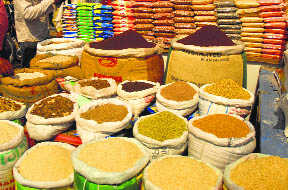Vibha Sharma
Tribune News Service
New Delhi, June 17
The Cabinet Committee on Economic Affairs (CCEA) today affected a modest increase of Rs 50 in the minimum support price (MSP) of the key Kharif crop paddy taking it up from Rs 1,360 per quintal to Rs 1,410 per quintal for the 2015-16 kharif season.
The MSP of Grade "A" variety was hiked from Rs 1,400 per quintal to Rs 1,450 per quintal. In comparison, the support price of pulses registered a substantial hike. After the increase of Rs 275 (Rs 75 MSP plus Rs 200 bonus) in the support price of moong and urad, the two varieties of pulses will now fetch farmers Rs 4,625 per quintal. The decisions were taken at the CCEA meeting headed by Prime Minister Narendra Modi.
Sources say the decisions are in line with the recommendation of advisory body Commission for Agricultural Costs and Prices (CACP).
The focus on pulses is a “strong signal” to farmers, particularly those in Punjab, Haryana and Western Uttar Pradesh that they should come out of the current sowing pattern that includes water-intensive paddy that stresses the natural resource and also the health of the soil.
Official sources say the CACP had recommended Rs 50 to Rs 75 hike for pulses. However, in view of large surplus of cereals and huge deficit in pulses, the Cabinet decided to give a bonus of Rs 200 per quintal for pulses over and above the recommendations of the CACP
Agriculture Minister Radha Mohan Singh said the increase in support price for pulses would provide impetus to farmers to increase acreage and invest in the productivity of pulses which the government has to import to meet the domestic requirement.
India imports about 4 million tonnes of pulses to meet the shortfall. The prices of pulses have risen by more than 64 per cent in the past one year due to decline in domestic production in 2014-15 crop year because of unfavourable weather conditions.
To resolve procurement issues, the Cabinet also directed that a credible procurement mechanism for pulses and oil seeds be put in place. While the procurement mechanism is strong for wheat and rice, it needs to be improved for pulses and oil seeds.
Though the Bihar elections are round the corner, the main beneficiary of the MSP regime are Punjab, Haryana and western UP and the government "felt no political compulsion" to hike the paddy MSP till the time the “neglected” Eastern belt of the country also becomes a beneficiary of the procurement mechanism, official sources say. The MSP is the rate at which government buys grain from farmer.
Paddy is the main crop grown in summer. Sowing of kharif crops starts with the onset of the South-West monsoon from June. Among cash crops, cotton's MSP has been raised by Rs 50 to Rs 4,100 per quintal for long staple and Rs 3,800 per quintal for medium staple cotton for 2015-16. The MSP of ragi was raised by Rs 100 per quintal to Rs 1,650 per quintal, jowar by Rs 40 per quintal to Rs 1,590, bajra by Rs 25 per quintal to Rs 1,275 and maize by Rs 15 per quintal to Rs 1,324.
Among oilseeds, the MSP of sunflower seed has been increased by Rs 50 to Rs 3,800 per quintal from over the last year. Yellow soyabean support price is up by Rs 40 to Rs 2,600 per quintal.
Unlock Exclusive Insights with The Tribune Premium
Take your experience further with Premium access.
Thought-provoking Opinions, Expert Analysis, In-depth Insights and other Member Only Benefits
Already a Member? Sign In Now










